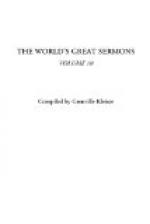I. If the first man had understood himself, he would have seen in himself the interpreter of nature. From the first command, “Let there be light,” to the final, “Let us make man in our image,” there are two things to be noted. There is continuity in the creative process, and there is an ascension from the lower to the higher. The first duty of our self-comprehending Adam will be to look backward. He will look across the wide field whose farther limit lies in cloud and whose hither border touches his feet. He will survey the creative process that has led up to and that has come to its climax in him. And as he thinks of himself as the product of nature, must he not conclude that as reason is the result, reason must have preceded the process and governed it? Humanity is the issue; therefore humanity must have planned the issue and secured it. Back of this march of life, behind this developing and ascending order, out in the darkness, before the light was created, there was the Mind that accounts for man. Thus the last becomes the first, the man that ends the creative process sees that a human God must have preceded the process.
This truth is one of the greater insights of the time. The continuity of life, from the lowest forms to the highest, has received during the last fifty years an unparalleled recognition. So, too, with the fact of the steady ascent of life. Not indeed in a literal and yet in a true way, the modern scientific conception is a wonderful parallel to the sublime hymn with which the Bible opens. In the beginning was the fire-mist. In that fire-mist began the process of development. It became worlds, systems innumerable, a stellar universe, and within this whole a solar order, an earth beating forward in preparation for the advent of life. Life when it came flowed into countless forms. From the shapeless mass it pushed on upward into successively higher and finer structures, ever aspiring toward man. Ages preceded the advent of man. There were upon the part of life ages of preparation, ages of climbing. Before life rose the mountain of the Lord; it must be scaled and its summit reached before man could put in an appearance. But the hour for which the whole cosmos had been travailing in pain could not be indefinitely delayed. In the fulness of time, as the tree bursts into bloom, as the tide rolls to the flood, as the light breaks in through the gates of morning, nature came to her supreme expression in man. Man is not here on his own strength. He is not in the bosom of things unaccounted for. He is the child of nature; her last act, her highest product, the best that is in her power to bring forth, the son in whose wondrous being her own motherhood is to undergo total transformation.




